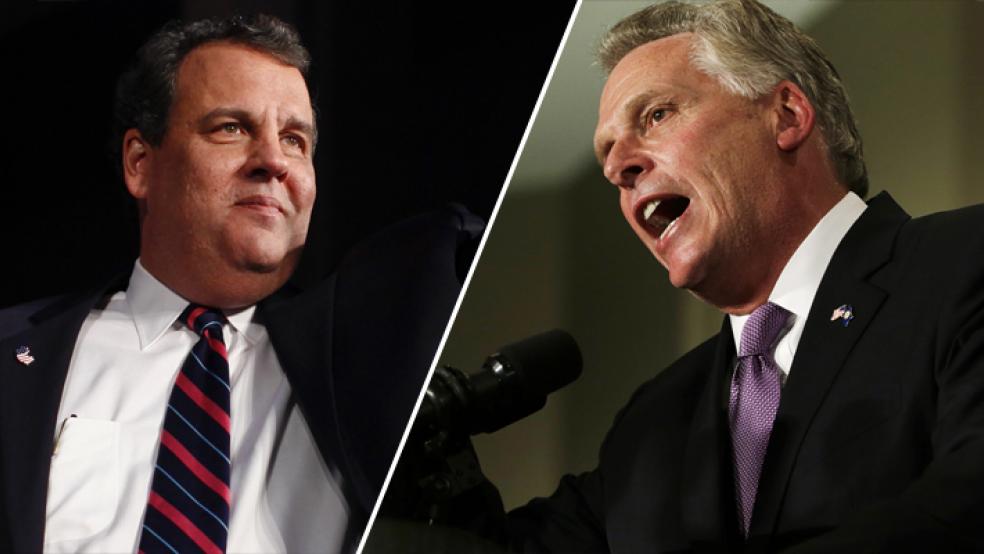Following are some takeaways I see in the election results.
1. New Jersey Governor Chris Christie is the establishment candidate for the Republican president nomination in 2016.
His impressive 60 percent victory in New Jersey clearly puts him at the front of the class for Republicans just looking for a winner in 2016. Ironically, Democrats are contributing to the view that Christie is the strongest Republican likely to run for the Republican nomination by immediately going after him in a post-election offensive. Why would they bother to do so if they weren’t worried about his vote-getting potential?
RELATED: FEARING SENATE LOSSES, DEMS NOW URGE OBAMACARE DELAY
Personally, I wouldn’t worry too much if I were a Democrat. Christie is poison among conservatives who dominate the Republican nominating process because he supports gun control and immigration reform; he believes in global warming and doesn’t demonize Democrats as the party of Satan, as many conservatives are wont to do.
Kentucky Senator Rand Paul, a darling of the Republican right, has already begun blasting Christie as, heaven forbid, a “moderate.” No doubt, other conservatives also seeking the Republican nomination, such as Texas Senator Ted Cruz and former Pennsylvania Senator Rick Santorum, will have worse to say in coming days.
The problem for Christie is that he is the strongest available Republican in the general election. But I see no possible way he can win the nomination when those who dominate the Republican primaries are conservatives who believe that the only reason Arizona Senator John McCain lost in 2008 and former Massachusetts Governor Mitt Romney lost in 2012 is because they were too moderate.
While there is a growing chorus of Republicans who think electability ought to rank higher on the list of qualities their presidential candidates ought to possess, the nominating process is still dominated by the Tea Party and religious conservatives who put devotion to principle above all else. I don’t see Christie winning these people over, and if he moves right to accommodate them then his electability goes out the window. I think he would be smart to sit out the 2016 race, which will probably be won by former First Lady Hillary Clinton, and wait for 2020.
RELATED: HOUSE GOP SUFFERS EPIC COLLAPSE AFTER SHUTDOWN
2. Virginia continues to trend Democratic, strengthening the Democratic hold on the all-important Electoral College. The importance of Democratic money man Terry McAuliffe’s victory in the Virginia governor’s race is that he won despite being a dreadful candidate. He is virtually a caricature of a “pol,” the sort of slimy politician who gets into politics to get rich—and does. Worse, McAuliffe is a “carpetbagger” born in New York with no close ties to the state he is now about to lead. Historically, such ties have been essential to victory in Virginia elections.
Yet McAuliffe won relatively easily by a 2.5 percent margin for one reason and one reason only—his Republican opponent, state attorney general Ken Cuccinelli, was widely viewed as a right-wing ideologue, obsessed with outlawing sodomy and abortion. Although music to the ears of some conservatives, such views turned off voters in all the state’s urban centers, especially in fast-growing Northern Virginia.
Not too many years ago, the Northern Virginia suburbs of Fairfax and Louden counties and the cities of Arlington and Alexandria were solidly Republican. Now they are solidly Democratic and provided McAuliffe with his statewide margin of victory.
If McAuliffe turns out to be half-competent, he could help the drift of Virginia out of the “red” column solidly into the “blue.” That will give Democrats an almost insurmountable Electoral College advantage in presidential elections, according to a post-2012 election analysis by ace election handicapper Nate Silver.
3. Republican outreach to libertarians is unnecessary. Many Republicans believe the party must move in a libertarian direction to pick up young voters and make the party viable in 2016. They can point to the Libertarian Party candidate Robert Sarvis who got 6.6 percent of the vote for governor in Virginia—enough to have handed an easy victory to Cuccinelli had the bulk of those votes gone Republican. Indeed, some Republicans charge that Sarvis cost him the election.
RELATED: HOW THE GOP TURNED FROM PRAGMATISM TO TRIBALISM
Libertarians respond that in fact Sarvis drew more from McAuliffe than Cuccinelli, according to polling. According to a pre-election Washington Post poll, if Sarvis wasn’t in the race then 53 percent of his support would have gone to McAuliffe and 43 percent to Cuccinelli.
However, an analysis by Keith Humphreys of the Reality-Based Community blog suggests that many of those libertarians did in fact vote for Republican Cuccinelli in the end. Sarvis’ final vote fell to 6.6 percent from pre-election polls showing him with 10.5 percent—a decline of 3.9 percent. At the same time, Cuccinelli’s final vote was 45.5 percent, up from 41.1 percent in pre-election polls—an increase of 4.4 percent. Since McAuliffe’s final vote was almost exactly the same as in the pre-election polls, this is a very strong evidence that libertarians defected heavily from Sarvis and voted for Cuccinelli.
This analysis would seem to indicate that Republicans have little to gain by reaching out for libertarians; they already get their votes on Election Day anyway. There is actually much more potential for Democrats to lure libertarians into their column by emphasizing issues such as immigration reform, drug legalization, privacy and opposition to the influence of religion in politics.
My final thought is that both parties did well enough on Tuesday that neither feels any need to change strategy, at least before the 2014 congressional elections. Polls suggest that the Democrats could do well and would probably retake control without the gerrymandering of so many districts in the Republicans’ favor. For example, an Economist/YouGov poll out this week shows 35 percent of voters saying they will vote Democratic next year versus 27 percent voting Republican. But no independent analyst is yet forecasting a Democratic takeover.
If Democrats do retake the House of Representatives, however, it will greatly strengthen pragmatists in the GOP that appear to be coalescing around Governor Christie.
Top Reads from The Fiscal Times:




